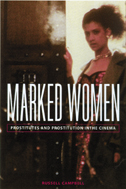Marked
Women
Prostitutes and Prostitution
in the Cinema
Russell Campbell
Wisconsin Film Studies
Patrick McGilligan, Series Editor
"Definitive. Marked Women will be the basic reference point for anyone doing any further
work in the subject of representations of female prostitution
in world cinema."—Chuck
Kleinhans, coeditor of Jump Cut
Julia Roberts played a prostitute, famously,
in Pretty Woman. So did Jodie Foster in Taxi Driver, Jane Fonda in Klute, Anna Karina in Vivre sa vie, Greta Garbo in Anna Christie, as did Charlize Theron, who
won an Academy Award for Monster. This engaging and generously
illustrated study explores the depiction of female prostitute
characters and prostitution in world cinema, from the silent
era to the present-day industry. From the woman with control
over her own destiny to the woman who cannot get away from her
pimp, Russell Campbell shows the diverse representations of prostitutes
in film.
Marked Women classifies fifteen recurrent character types and
three common narratives, many of them with their roots in male
fantasy. The "Happy Hooker," for example, is the liberated
woman whose only goal is to give as much pleasure as she receives,
while the "Avenger," a nightmare of the male imagination,
represents the threat of women taking retribution for all the
oppression they have suffered at the hands of men. The "Love
Story," a common narrative, represents the prostitute as
both heroine and anti-heroine, while "Condemned to Death"
allows men to manifest, in imagination only, their hostility
toward women by killing off the troubled prostitute in an act
of cathartic violence.
The figure of the woman whose body is available at a price has
fascinated and intrigued filmmakers and filmgoers since the very
beginning of cinema, but the manner of representation has also
been highly conflicted and fiercely contested. Campbell explores
the cinematic prostitute as a figure shaped by both reactionary
thought and feminist challenges to the norm, demonstrating how
the film industry itself is split by fascinating contradictions.
"Marked Women offers a comprehensive comparative study of
the image of the female prostitute across international film
history."
—Maureen
Turim, author of Films of Oshima Nagisa
Russell Campbell is senior lecturer in the Film Programme at Victoria University
of Wellington, New Zealand. He is the author of numerous articles
and several books, including Cinema Strikes Back: Radical
Filmmaking in the United States, 1930–1942. Campbell
was the founding editor of The Velvet Light Trap and is
also a professional script consultant and documentary filmmaker.
Media & bookseller inquiries regarding review copies, events, and interviews can be directed to the publicity department at publicity@wwwtest.uwpress.wisc.edu or (608) 263-0734. (If you want to examine a book for possible course use, please see our Course Books page. If you want to examine a book for possible rights licensing, please see Rights & Permissions.)
|
|

December 2005
LC: 2005008259 PN
472 pp. 6 x 9
76 b/w film stills
|
